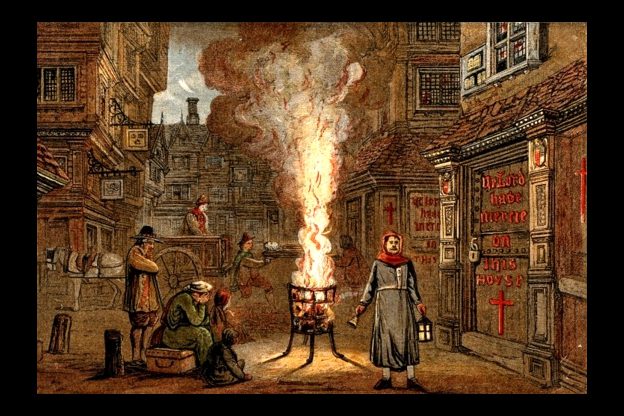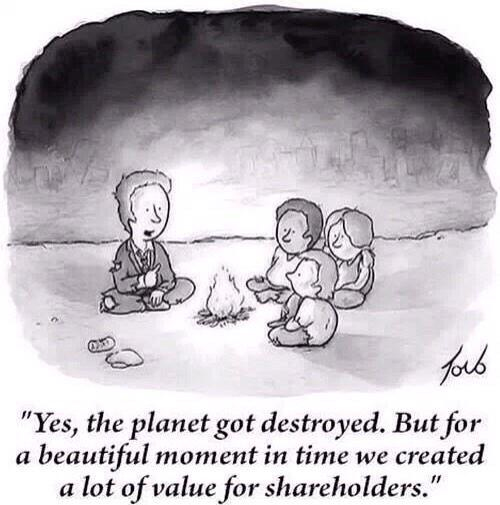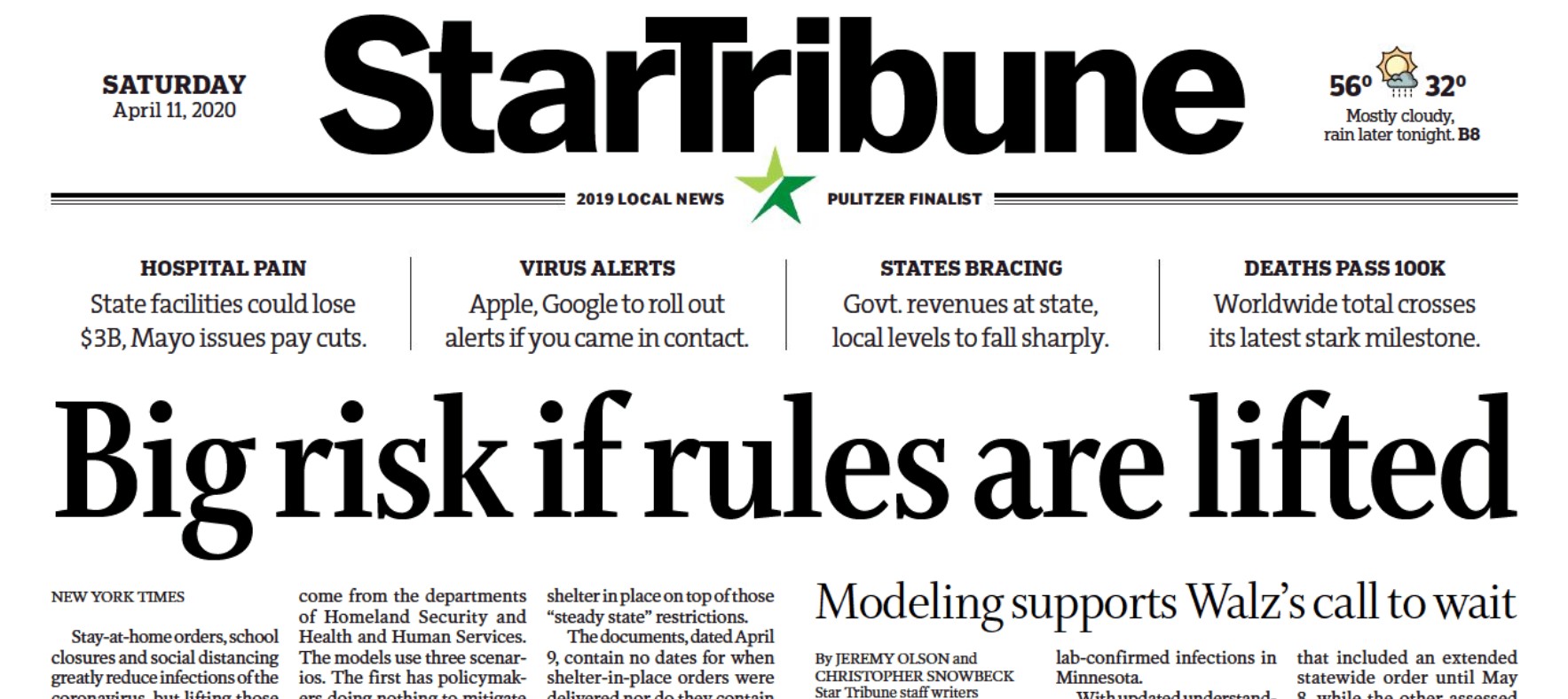

And decrease the surplus population
Some of you will remember a creepy and raving unsigned advertisement in the Star Tribune perhaps a couple of weeks ago. It claimed we were committing “economic suicide,” by closing bars and restaurants and limiting the size of meetings. It was full of balancing the loss of life against damage to the precious economy, with a dash of “the serfs need to get back to work” thrown in.
Some you may have though, Gee, that sounds like a genuine Lyndon LaRouche figure. You were only a letter off. The advertisement was taken out by Kevin Roche.
You might have also thought from the discussion of weighing lives versus money that the author might be an insurance man. Right again. Roche is the former general counsel of United Healthcare. Go Loons!
Kevin Roche v.2.0 is a healthcare consultant, and according to his LinkedIn page, he’s all about maximizing company, that is, shareholder, value. Go Kevin!

Provenance uncertain, maybe the New Yorker
We know about Roche’s valiant efforts to bring us all to our senses because of a thrilling prose trilogy by Scott Johnson at Powerline, in a series entitled KEVIN ROCHE: MY STRUGGLE WITH THE STAR TRIBUNE. From part one:
[Roche] writes: “I have had an astounding back and forth with the paper in regard to the ad they are refusing to place, but won’t give me any specifics on why. Since the paper has published many advocacy ads over the years, I was stunned by this refusal….I suspect someone just wants to suppress the viewpoint, which is purely along the lines of the need to balance the harms of the lockdown versus whatever damage might occur from the virus.”
It astounds me that Roche is astounded that the Strib didn’t want to publish an unsigned hit piece.
Johnson calls the ad a “column.” Jeepers, Scott, even your pal Kathy Kersten must use her name when she pops off.
It was clearly an attack ad on the Walz administration.
Powerline Part Two is the banter between the Strib and Roche. In addition to being an ideologue, it seems that Roche is a bit of a chiseler:
The text [of the ad] is attached, it is not so much an ad as a public opinion or commentary kind of piece. I am assuming that with what has happened the rate for publication will be pretty good. [emphasis added] I would appreciate advice on which section it is best to place the ad in so it gets the most attention. Please feel free to call me at [number omitted] [by Powerline].
In effect, Roche says, In my piece, I minimize the virus, but I expect you to give me a great rate because of this catastrophe.
The dialogue goes on at some length with the Strib quoting its advertising policy multiple times, and Roche saying, also multiple times, I don’t understand. We know at some point the Strib relented and published a version of the piece quoted in Powerline Part Three. Let’s hope the Strib held out for the full ad rate.
One wonders what impels an individual to spend the kind of money required to place an advocacy advertisement in the Strib unless he had some ulterior motive, beyond saving the public.
Perhaps feeling sorry for Roche, or giving him a spiff for all the money he spent (unlikely), the opinion editors also gave him some free ink in a commentary on Friday, April 10th. After that 500-word lede, the commentary is what I want to talk about. Roche writes:
This [shelter in place] order was premised on results from a model which allegedly showed that up to 74,000 people could die from coronavirus disease in Minnesota.
Now, Roche is a lawyer. Presumably, he knows what “allegedly” means. Models don’t “allege” things; they make predictions. The National Weather Service doesn’t “allege” that it will be nice tomorrow; it predicts that, based on models. This is also true of health care and epidemiological models: they make predictions.
We also know that models are sometimes wrong. There are, according to media reports, at least a couple of models that the Walz administration has been using, from the Department of Health and the University of Minnesota. Well, more than that, really. Roche knows these things, I am sure. He claims to be a healthcare guru, after all.
And here’s the front page of the Star Tribune on April 11th.

April 11, 2020
The use of the term “allegedly” is highly pejorative and unworthy of someone of Roche’s stature. Or maybe alleged stature. I think that somebody who was trying to advance the discussion would choose his words more carefully, not only in the op-ed, but in the advertisement he ran.
Maybe he means to intimate that the governor is lying about what the models show. That would be even more pejorative, of course. It would be cheeky, though, to claim that the governor was not only wrong, but acting in bad faith or lying. It ought to seem hard, even for Republicans, to conclude that the governor wants to wreck the economy just for the hell of it.
I think this elbows-and-knees-under-the-basket bullshit is just that, when the Walz administration is faced with a pandemic unlike anything faced by a governor since the Kansas (because that is where it originally came from) flu pandemic of 1918. This is just a small flavor of what happened back then, a hundred years ago:
To reduce the spread of the flu, health officials directed Minnesotans to rest, use handkerchiefs, and go to bed and contact a doctor if symptoms arose. They discouraged standing in crowds, spitting on floors and sidewalks, and sharing drinking cups and towels. Government officials throughout the state closed public spaces in an attempt to prevent the spread of the flu. Schools, libraries, dance and pool halls, theaters, bowling alleys, churches, and lodge halls were shuttered. Public events such as parties, meetings, and funerals were banned. After children in Bemidji flooded a school playground on the Sunday after school was closed, the mayor authorized ten men to patrol the city to ensure the stay-at-home ban was respected.
The epidemic affected multiple areas of community life. In St. Paul, operating elevators in buildings with less than seven stories was prohibited to reduce human contact. Streetcar drivers were directed to keep their windows open so that fresh air could circulate; the number of riders allowed was reduced. Retail businesses could not advertise sales and their hours were regulated. Postal carriers and the Boy Scouts delivered influenza information to homes, stores, and offices, but compliance with the regulations was variable. On the night before the public events ban went into effect in Minneapolis, people gathered in lines outside theaters despite the risk of disease exposure. While some protested the changes, monetary cost, and income loss while complying with the rules, others blatantly defied them. Minneapolis and St. Paul health officials were inconsistent in managing the epidemic in their cities.
I guess there were nay-sayers and scofflaws back then, too.
Roche says he wants to balance the harm to humans with the harm to the economy. But because the situation is terra incognito, he has no idea what to place on either side of the balance.
We might discuss why we run the economy anyway: permit the formation of capital with limited liability, create capital and credit markets and an insured banking system, create and regulate a transportation system that permits commerce, provide for the enforcement of intellectual property, enforce contracts in court, and the list goes on. None of this would exist, nor would United Health Care or Roche’s consulting company, without the backstop of government.
So, why do we do it? So United Health Care and its executives, including Kevin Roche, and the companies Roche consults for can become rich? Well it seems that way, sometimes. Really, though, the economy is supported and exists because it is in the public, that is the humans’, interest. The Dow and the NASDAQ are the only ways some people, certainly including our president, can measure the public interest. But that’s a blinkered view.
On the other side of the balance, we don’t really know as much about the consequences of this policy or that policy as we would like. We do know that if we get it wrong, a lot of people are going to suffer and die.
Everyone should find that sobering, including Kevin Roche, although he seems more interested in scoring political points.
Afterword
I believe that one of the underlying pathologies at work here is a fear that things are going to be different, maybe radically different, when the pandemic ends.
I know that scares the Trump administration, with the president’s incessant shrieking about getting back to normal and saying that the economy will bounce back quickly. (It has to, if Trump has any chance of rescuing his cratering campaign. If he was smart, he’d pull a Lyndon Johnson and say he was going to spend the rest of the term attacking the Invisible Enemy.) It scares the Minnesota Chamber of Commerce, Paul Gazelka, Roger Chamberlain, Scott Newman, Mary Franson, Jeremy Munson, and yes, Kevin Roche, too.
WE WILL BUILD IT AGAIN!
— Donald J. Trump (@realDonaldTrump) April 11, 2020
There was a terrific op-ed in the New York Times on Friday the 10th that describes the sum of these fears, titled The Ideas That Won’t Survive the Coronavirus. From the piece:
If anything good emerges out of this period, it might be an awakening to the pre-existing conditions of our body politic. We were not as healthy as we thought we were. The biological virus afflicting individuals is also a social virus. Its symptoms — inequality, callousness, selfishness and a profit motive that undervalues human life and overvalues commodities — were for too long masked by the hearty good cheer of American exceptionalism, the ruddiness of someone a few steps away from a heart attack.
Even if America as we know it survives the coronavirus, it can hardly emerge unscathed. If the illusion of invincibility is shredded for any patient who survives a near-fatal experience, then what might die after Covid-19 is the myth that we are the best country on earth, a belief common even among the poor, the marginal, the precariat, who must believe in their own Americanness if in nothing else.
Thanks for your feedback. If we like what you have to say, it may appear in a future post of reader reactions.

